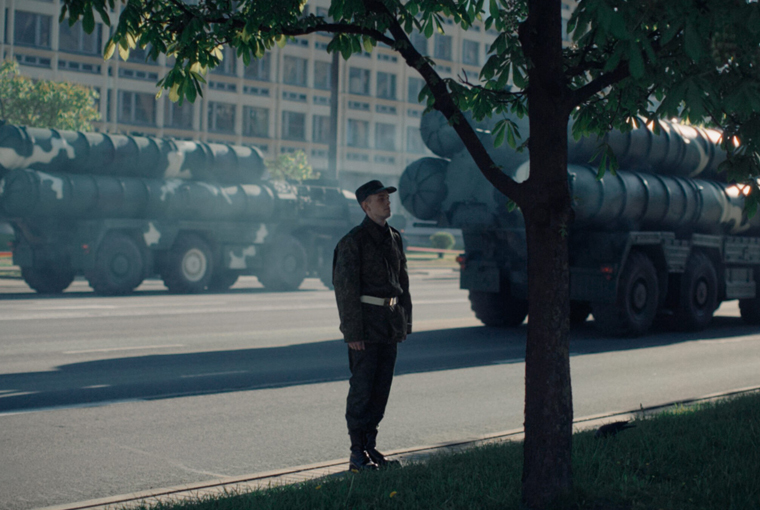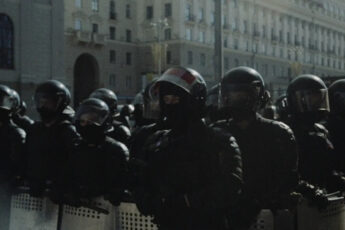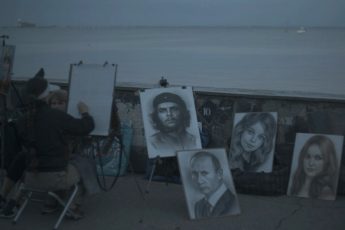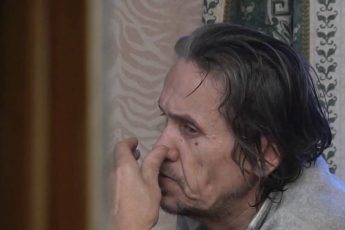The Present and Future of Belarus’ Compulsory Military Service
Alexander Mihalkovich and Hanna Badziaka’s Motherland (2023)
Vol. 134 (April 2023) by Antonis Lagarias
Maxim Gorky’s collection of short stories Tales of Italy, written in the early 1910s, includes “The Mother”, a story that starts with a line reflecting socialist ideals of motherhood: “Let us raise our voices in praise of woman, the Mother, inexhaustible fount of all-conquering life!” In the story, a single mother (spelled with a capital M) demands to see Timur, the grand Turco-Mongol conqueror who has just defeated the Ottoman army. Faced with the great military leader instead of begging or shaking in fear, she orders him to locate her son, a prisoner of war, and return him to her. To the surprise of Timur’s court, the “king of kings” humbly complies to her request and commands his soldiers to set off across his empire in search of the lost son. The story ends with an ode to maternal love, a unique force that “serves Life and not Death”1 and thus represents a higher form of power that transcends any social hierarchy. While the new Soviet administration initially envisioned a rupture of the family institution, which it viewed as a bourgeois structure, and proclaimed women’s liberation from the burdens of housework and reproduction, official Soviet policies endorsed strong families and glorified motherhood. By the end of the 1920s, family and motherhood had become important ideological building blocks of Communist institutions.2 In this, the Soviet Union joined the logic of capitalist countries where women are asked to perform wage-less domestic and procreant labor, ensuring the reproduction of the workforce. The honorary title of “Mother Heroine” was established in 1944 to honor mothers with large families, one of the highest grades of distinctions comparable to the “Hero of the Soviet Union”.
It is not surprising that during WWII the terms “Motherland” or “Mother Russia” were used to refer to Russia and the Soviet Union. While the personification of a country is not a Soviet invention, its extensive use in Soviet culture and official policies (related symbols and phrases appeared on statues, stamps, posters, etc.) produced connotations that necessarily come into play when a film uses one of those terms in its title. Alexander Mihalkovich and Hanna Badziaka’s documentary Motherland, shot in Belarus, addresses the country’s compulsory military service that forces young male adults to spend more than a year inside the army barracks. Like in the novel, the film depicts mothers searching for their sons who have left the household and joined the army. The documentary opens with an intertitle informing the audience of “Dedovshchina” (grandads), an informal practice widely used in the Soviet army that is still in place in the Belarus army. This practice allows junior conscripts to be systematically abused and humiliated by their senior officers. The film’s voice-over recounts several letters from a young conscript addressed to his mother, based on Mihalkovich’s own army experience but edited for the film. The letters describe an ambiance of fear, power and control that establish the power dynamics inside the barracks. The film soon turns to a mother who has lost her son, after he allegedly committed suicide on army premises during his service. Refusing to accept that her son killed himself, she embarks on a quest for justice, gathering testimonies from other mothers and pursuing class-action lawsuits against military officials. As her quest advances, the film implies that many deaths inside the army are falsely presented as suicides and were, in fact, the result of intense torture.
Unlike Gorky’s fictional Mother, her contemporary counterparts have little luck in their pursuit. The film briefly presents court rulings in favor of army officials which, as implied in the film, are linked to wide corruption spread from the military to civil and legal institutions. In the film, a mother’s plea can no longer move the rusty wheels of a cold and corrupt political system. The film then changes its focus to record scenes from the large-scale police repression that took place during the 2020 protests. Different facets of Belarusian society are also brought to light, from a nationalist father who thinks his son’s adolescent mind will be “straightened-out” during his army service, to mothers paralyzed by grief, and young boys who, entering adulthood, must decide whether to report for service or else find a way to avoid it (the only two “viable” options being to flee the country or to be declared mentally or physically inapt). Packed with information, this collage of different angles attempts to present both real concerns and problematic common assumptions about the compulsory military service system. Alternating images of cheering crowds at official military celebrations and personal accounts from young conscripts and their mothers who tell a different story, the film paints the portrait of an uncertain society which, with the 2020 protests, just made its first (and unsteady) steps towards social change. The film ends on a straightforward moralizing note read from the young conscript’s final letter. He has become a senior officer and the same system that abused him now hands him control over fresh recruits. Reluctantly, he confesses to his mother that he is now torturing the young, unable to resist the seduction of power.
If terrible, though, the facts presented in the film are hardly shocking. The grim personal and social consequences of compulsory military service can be seen in most countries (including thirteen on European soil3) that have not yet abandoned conscription. Suicide among conscripts being a subject of international research since the 1990s, compulsory military service is shown to have significant and lasting negative effects on physical and mental health.4 In this, the film’s stance may appear naïve. Instead of turning against the logic of compulsory military service itself, the documentary seems to unquestioningly adopt a view that places the fault in corruption inherited from the Soviet era. Although emotionally devastating, the mother’s quest for justice appears to be driven by the “bad apples” metaphor which suggests that corruption lies in specific people or groups that must be cleansed for the system to function as it was designed to. However difficult it may be to compare the scale of in-barracks violence between different countries, violence in the context of compulsory military service stems from systemic reasons linked to how conscription was designed. It destroys social ties and fosters specific gender dynamics, reinforcing stereotypes of male strength and female weakness, and often promotes conservative political ideology and blind nationalism. The film’s problematic reading is only confirmed in its depiction of the country’s elections. In 2020, Belarus was shaken by massive yet peaceful protests against the election results, allegedly rigged to favor Alexander Lukashenko (in power since 1993). Associating the practice of “Dedovshchina” with corrupt elections results is an easy anti-corruption statement (here translated in anti-Lukashenko terms) that fails to explain the roots of the problem or to present a full account of the masculine mentality and nationalist pride that ultimately fuel and sustain the disastrous conditions of most national armies.
It is perhaps difficult to discuss the abolition of compulsory military service and it is probably even harder to advocate for a full abolition of national armies. After all, in countries that still apply conscription, many would still agree that the conservative values passed down within army barracks are beneficial for a country’s national cohesion and cultural tradition. However, middle-ground statements rarely lead to significant discussion. Given the surge in political filmmaking in Belarus following the mass protests of 2020 (see for instance Sasha Kulak’s Mara from 2022), there is perhaps an opportunity for documentaries to move beyond simple anti-Soviet and anti-corruption statements that solely place the blame in the Soviet past, thus risking to create a defeatist mentality while failing to grasp the full scope of the problem. A similar argument can be said for the emphasis given at the end of the film to the seduction of power. While it is essential to examine how people react to authority and control, to simply suggest that a latent desire for power is the determining factor for the continuation of these systems is to attribute responsibility to an abstract “human nature”; in other words, to all and none. Such arguments feel overly simplistic while also obscuring our ability to imagine solutions. In addition, the common assumption that abuse begets abuse, or the contested theory claiming that victims are likely to become aggressors, have never been enough to explain the problem. Instead, one could delve deeper and seek to understand how such systems of power and control produce values, habits, and mentalities. It is this superstructure that remains operational even in countries without a Soviet past and even when most people agree to be against them, in principle at least.
References
- 1.Timur recognizes that, “She speaks to me as to an equal, and she does not beg, she demands. And I see now, I understand why this woman is so strong-she loves, and love has taught her that her child is the spark of life which can kindle a flame for many centuries“. The story concludes with the statement that “the woman smiled and all the kings smiled and the princes, and the chieftains smiled, they were all children as they gazed upon her – upon the Mother!’’. Maxim Gorky. Collected Works in Ten Volumes, Volume VI. Progress Publishers Moscow, 48-56.
- 2.See David L. Hoffmann’s “Mothers in the Motherland: Stalinist Pronatalism in Its Pan-European Context’’. Journal of Social History. Oxford University Press, Autumn 2000 (Vol. 34/No. 1), 35- 54.
- 3.Apart from Belarus, in 2023 this list also includes Austria, Cyprus, Denmark, Estonia, Finland, Greece, Lithuania, Moldova, Norway, Switzerland, Sweden and Ukraine (not counting Russia or Turkey).
- 4.There is extensive research on the issue, see for instance Mauri Marttunen, MD PhD and others. “Suicide among Military Conscripts in Finland: A Psychological Autopsy Study’’. Military Medicine. January 1997 (Volume 162/1), 14–18. Or, for an investigation of the effects of military service in South Korea, see: Bethmann D, Cho JI. “Conscription hurts: The effects of military service on physical health, drinking, and smoking’’. SSM Popul Health. 2023 (22:101391).




Leave a Comment